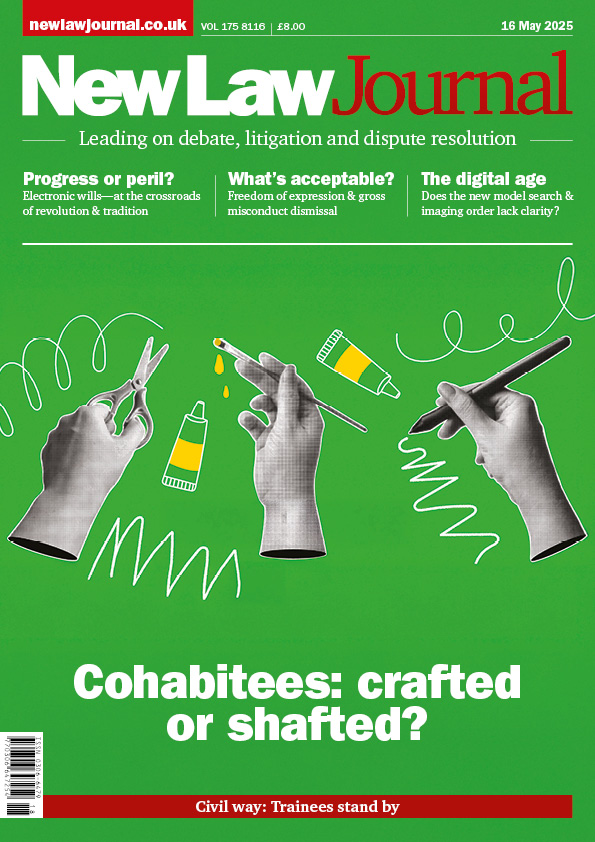THIS ISSUE

Protection for whistleblowers provides the main focus for Charles Pigott’s employment legal update, in this week’s NLJ. Pigott, professional support lawyer, Mills & Reeve, covers a range of situations, including unpaid charitable trustees and job applicants. He writes that it is ‘hard to see the logic of excluding job applicants, given they fall within the employment provisions of [the Equality Act 2010]’.
Robust legislation is needed to tackle the online advertising of prostitution, Lesley Manley, barrister at Church Court Chambers, urges in this week’s NLJ. New laws have been mooted, and must be ‘enforceable and effective’ and ‘avoid any unintended consequences’, she writes.
The famous phrase, ‘All rise’, is being changed to ‘All rise, if able’, to be called out by the usher upon the judge or magistrate entering court. NLJ columnist and former district judge Stephen Gold notes, wryly, ‘if there is an usher, of course’.
Nicholas Dobson follows up on Higgs v Farmor’s School, examining the Court of Appeal judgment on a gross misconduct dismissal
Trainees stand by; the King needs DJs!; Rules, Rules, Rules; High Court Control; body news
Lawyers have warned the government’s immigration white paper could hike costs for employers and lead to labour shortages.
Mergers and acquisitions are out and marginal gains are in, according to the Bellwether Report 2025.
Lawyers have uncovered a major inheritance tax oversight affecting thousands of families of victims of the infected blood scandal
The professional title ‘CILEX Chartered Paralegal’ has received the royal seal of approval—but not the congratulations of Chancery Lane.
MOVERS & SHAKERS

Freeths—Ruth Clare
National real estate team bolstered by partner hire in Manchester

Farrer & Co—Claire Gordon
Partner appointed head of family team

mfg Solicitors—Neil Harrison
Firm strengthens agriculture and rural affairs team with partner return
NEWS
Conveyancing lawyers have enjoyed a rapid win after campaigning against UK Finance’s decision to charge for access to the Mortgage Lenders’ Handbook
The Crown Prosecution Service (CPS) has launched a recruitment drive for talented early career and more senior barristers and solicitors
Regulators differed in the clarity and consistency of their post-Mazur advice and guidance, according to an interim report by the Legal Services Board (LSB)
The dangers of uncritical artificial intelligence (AI) use in legal practice are no longer hypothetical. In this week's NLJ, Dr Charanjit Singh of Holborn Chambers examines cases where lawyers relied on ‘hallucinated’ citations — entirely fictitious authorities generated by AI tools
The Solicitors Act 1974 may still underpin legal regulation, but its age is increasingly showing. Writing in NLJ this week, Victoria Morrison-Hughes of the Association of Costs Lawyers argues that the Act is ‘out of step with modern consumer law’ and actively deters fairness









